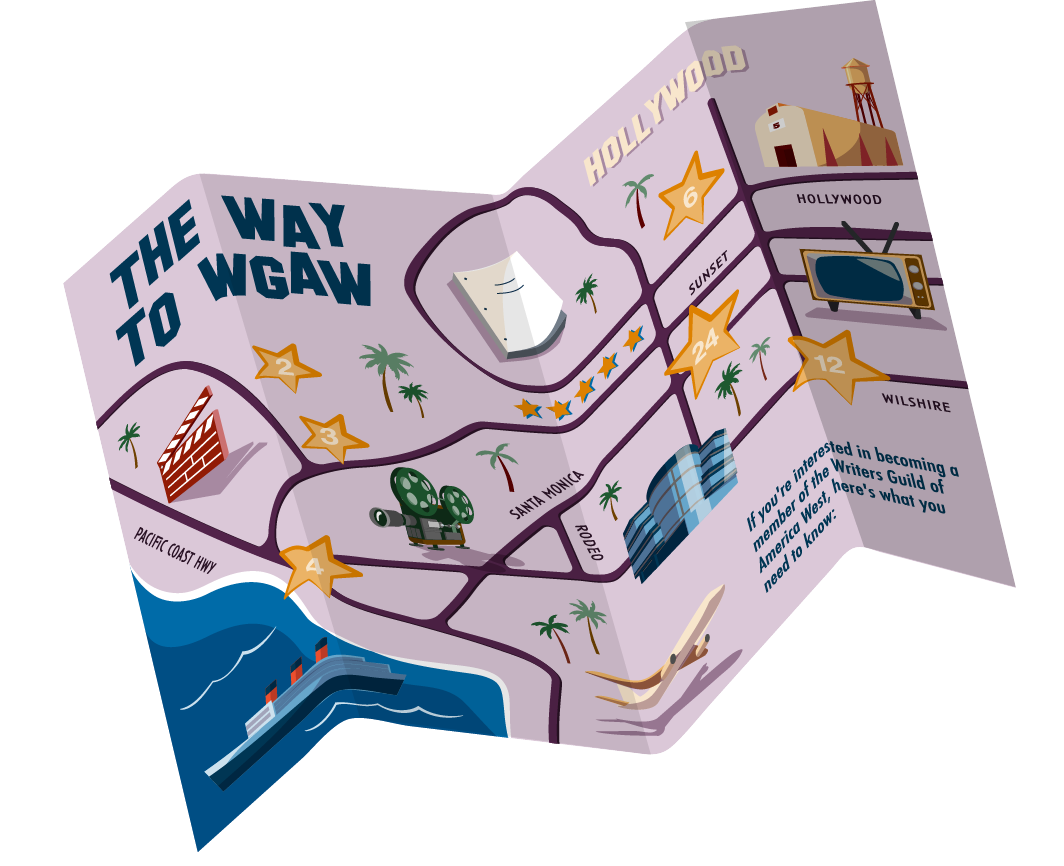Members
July 15, 2025
This TV series compensation guide—the Guild’s third, following releases in 2019 and 2021—synthesizes data from over 1,200 TV series deals from the 2023 MBA. Most deal terms used to compile this guide were provided by agencies, as required by the WGA Franchise Agreement.
Writer-Producer Compensation
Weekly Rates
An increasing number of writer-producers now negotiate their compensation as a weekly fee. At the time of the 2021 deal guide, about 3 in 10 deals from Co-Producer to Co-Executive Producer were negotiated as weekly rates; that share has now increased to over 6 in 10. And roughly 1 in 3 EP and Showrunner deals analyzed for this guide used a weekly fee, with a median rate of $13,000 per week.
Since 2021, all job titles have seen growth in median weekly rates, which now range from $9,263 for Co-Producers to $13,000 for Executive Producers and Showrunners. The maximum reported rates are $2,500 to $9,500 more than the median rates, with EP/Showrunners seeing rates up to $22,500 per week.
As data collection on writer compensation is ongoing, the maximum rates reflected throughout this guide may not capture the maximum any writer is currently earning or could earn going forward.
| All Series Weekly Rates | |||
|---|---|---|---|
| Job Title | Median | Change vs. 2021 | Maximum Reported |
| Co-Producer | $9,263 | +$1,532 | $11,769 |
| Producer | $10,000 | +$2,000 | $13,500 |
| Supervising Producer | $10,000 | +$1,712 | $12,500 |
| Co-Executive Producer | $12,500 | +$2,250 | $20,000 |
| Executive Producer/ Showrunner (excluding overall deals) |
$13,000 | n/a1 | $22,500 |
The 2023 MBA established a new minimum weekly rate for Writer-Producers that is 9.5% higher than the Story Editor/Executive Story Editor rate, contributing to these increases.
Staff Writer, Story Editor and Executive Story Editor Compensation
Nearly all Staff Writers, Story Editors, and Executive Story Editors are paid weekly compensation rates, often negotiated as a percentage over the applicable scale in Article 13 or Article 14 of the MBA. While these writers are typically paid at scale, maximum compensation reached up to 17% over the Article 13 rates for Staff Writers and 22% over the Article 14 rates for Executive Story Editors.
| All Series Weekly Rates2 | |
|---|---|
| Job Title | Maximum Reported |
| Staff Writer | Scale + 17% |
| Story Editor | Scale + 5% |
| Executive Story Editor | Scale + 22% |
The 2023 MBA also requires that for the first time, Staff Writers must be paid script fees for the episodes they write.
Episodic Rates
The past few years have seen the continued growth of short seasons and rooms convened prior to a production order, which has made negotiating weekly rates more common for many writer-producers. Still, more than half of the upper level writer deals reviewed for this analysis were negotiated as episodic rates.
The following quotes reflect median (the midpoint of reported deals) and maximum reported episodic pay for Co-Executive Producers, Executive Producers, and Showrunners for half-hour and one-hour series.
| One-Hour Episodic Rates | |||
|---|---|---|---|
| Job Title | Median | Change vs. 2021 | Maximum Reported |
| Co-Executive Producer | $32,500 | +$5,000 | $70,000 |
| Executive Producer (excluding overall deals) |
$52,500 | +$12,500 | $140,000 |
| Showrunner (excluding overall deals) |
$75,000 | +$22,500 | $225,000 |
| Half-Hour Episodic Rates | |||
|---|---|---|---|
| Job Title | Median | Change vs. 2021 | Maximum Reported |
| Co-Executive Producer | $30,000 | +$5,000 | $60,000 |
| Executive Producer (excluding overall deals) |
$47,500 | +$12,500 | $125,000 |
| Showrunner (excluding overall deals) |
$62,500 | +$20,000 | $125,000 |
Span protections were expanded in the 2023 MBA by increasing the earnings cap for eligibility to $450,000 for writers working on short order broadcast, pay TV or HBSVOD series (defined as 12 or fewer episodes for broadcast series, and 14 or fewer episodes for pay TV and HBSVOD series) and extending the protection to writers on limited series. If you do not qualify for the MBA’s span provision, your episodic rate can be amortized down to minimum depending on how many weeks you work, unlike a negotiated weekly rate. See the Deal Hub’s Weekly Pay Calculator to help you and your reps determine what your weekly pay might be under different types of deals, whether an episodic or weekly deal might be better for you, and/or whether additional deal terms are necessary to ensure prompt overscale payment.
Many TV writers now also include overscale span protections in their deals in the form of a specified weekly floor or a limit on the number of weeks the episodic fees will cover, requiring additional pay for weeks worked beyond a certain threshold. These weekly rates may apply for the duration of the deal, or after a specified number of weeks has elapsed (i.e. $20,000 per week after 52 weeks). Negotiating weekly rates can ensure your overscale pay is not amortized to scale.
Less than 20-Week Development Room Rates
The 2023 MBA established new premium weekly minimums for writers working in development rooms of at least three writers—including rooms opened between seasons of a show—who are guaranteed less than 20 weeks of employment. These writers must be paid weekly rates that are 25% above the standard writers room minimums. Additionally, writers must be guaranteed at least 10 weeks of employment if their room opened without a production order.
| Development Room Premium Rates (up to 19 Weeks) | |
|---|---|
| Job Title | Rates as of May 2, 2025 |
| Staff Writer | $7,419 |
| Story Editor/Executive Story Editor | $13,835 |
| Writer-Producer | $15,152 |
Premium development rooms have substantially higher scale rates than regular development rooms; in this analysis, some writer deals examined had overscale rates up to $30,000 per week.
Below Minimum Rates in Post
Look out for below-minimum terms in your series compensation deals paying you less than Guild weekly minimum in post-production. Writers continue to work in post and must be paid MBA minimums and receive pension and health contributions through the duration of their work on a series—not a below-minimum weekly rate without pension and health contributions. The Guild is bringing enforcement actions where this is happening and has reached settlements with studios for MBA minimums, contributions, and interest.
Are you working in post, or have you worked in post, for less than MBA minimum or without P&H contributions? Contact Contracts & Information Analyst Missy Brown.
Additional Resources
- Are you negotiating a deal with a particular studio and looking for more specific information on comparable series deals with that studio? Contact the Agency Department. This information can be helpful when a studio claims that it does not compensate writers above a specified amount.
- Have you been asked to perform free work in TV development? Contact Business Representative Chris Milliken, who can help you combat free work abuse and discuss potential enforcement options with you.
The Guild is committed to raising writer pay levels across the board. As part of this ongoing effort, the Guild will continue providing information and developing materials that shed light on writer compensation in all markets. This effort is supported by writer compensation information that franchised agencies are required to provide. If you are not represented by an agency, please remember to submit your contracts directly to the Guild.
As a reminder, WGA Working Rule 3 requires writers to provide the Guild with copies of all employment, option and purchase contracts no later than one week after receipt of the contract. Aggregated compensation information, as used in this analysis, is extremely valuable to guide members’ and representatives’ deal-making.
See the 2023 MBA Schedule of Minimums.
12021 Executive Producer and Showrunner deals had insufficient data points for a weekly median.
2For Staff Writers, “scale” refers to the applicable Article 13 weekly minimum compensation. For Story Editors and Executive Story Editors, “scale” refers to the applicable Article 14 weekly minimum compensation.





